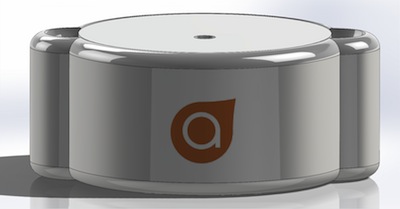 Since the 34 teams competing for the Qualcomm Tricorder were announced in November, a few, like Scanadu, have caught the public eye while the vast majority remained in stealth mode. Now at least one team, Johns Hopkins University's Aezon, is poking its head out to crowdfund its entry on Indiegogo. The team is attempting to raise $10,000 to support its shot at $10 million.
Since the 34 teams competing for the Qualcomm Tricorder were announced in November, a few, like Scanadu, have caught the public eye while the vast majority remained in stealth mode. Now at least one team, Johns Hopkins University's Aezon, is poking its head out to crowdfund its entry on Indiegogo. The team is attempting to raise $10,000 to support its shot at $10 million.
"So far we haven't had a lot of high costs," team member Neil Rens said. "We have facilities here we can use to do our work, so we just purchase some small microcontrollers and use the school's 3D printing equipment. We're raising money to go to manufacturers and get a higher quality prototype to do usability testing and accuracy testing."
These days, most technology projects on Indiegogo end up being more like pre-order stores, including Scanadu's record-breaking campaign, which allowed users to buy beta versions of the Scanadu Scout even before the device received FDA 510(k) clearance. Aezon's campaign is much more of a fundraising project: the team is offering backers T-shirts, thank you notes, and a chance to have their names inscribed on the device submitted for judging.
"Right now we don't feel we can deliver our actual product to people who contribute on Indiegogo," Rens said. "Part of that is our product is not submitted for FDA approval. We're still working out kinks on our end. We don't want to release the product that we don't feel is ready for prime time. So right now the value we offer to people who contribute is re-envisioning how technology can change medicine. They're contributing to this vision that we have."
Aezon's tricorder pitch is a three part system which includes a cloud-based smartphone interface, a cylindrical lab box about three inches in diameter and three inches tall, and a wearable device for monitoring vitals signs, including heart rate, ECG, blood oxygenation, and respirations. The 3D-printed lab box analyzes blood, urine, or saliva and sends the data back to the cloud.
Rens said the team's angle is to integrate existing technologies into a convenient form factor, and to build a device that meets all, not just the minimum required number, of the X Prize requirements. The guidelines allow teams to choose from a list of diseases their device can diagnose, for instance, but Aezon is aiming to do the whole list.
The part of the team working on the wearable device has spun off into a startup, Aegle, that will continue working on the wearable and attempt to market it separately. That startup has been accepted into DreamIt Health's Baltimore class. They will also work with Aezon and submit their product as part of the whole Aezon system.
"The development of their part of our system was going quicker and they have more immediate commercial viability," Rens said. "So they decided to pursue that and try to accelerate that development. But they'll still be submitting with us to the Tricorder X Prize."















